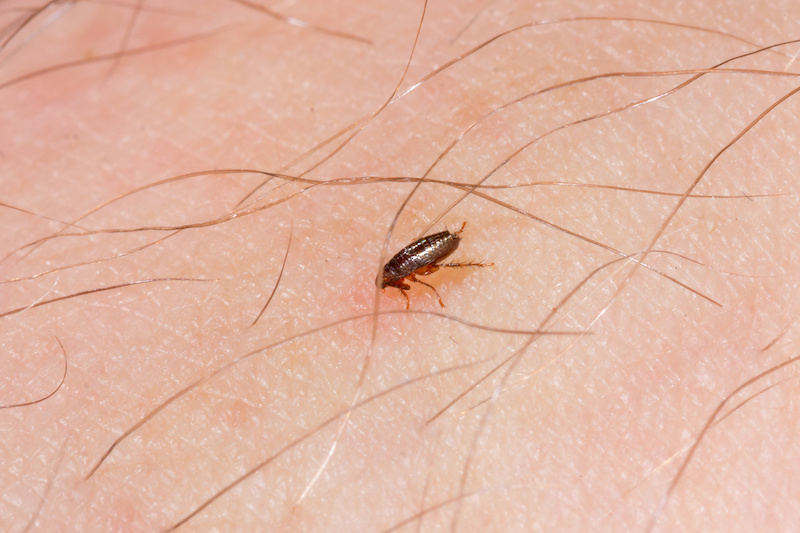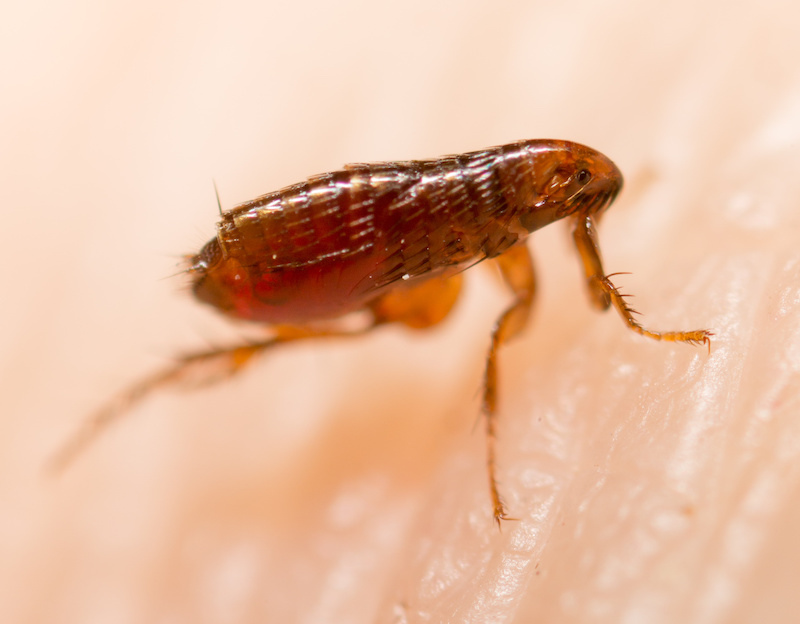Updated April 25, 2025
Did you know a flea’s initial acceleration force is around 150G?
These little parasites are hard to kill in more ways than one. Besides being able to accelerate at a force that would turn a human’s squishy internals into liquified externals, many of us find we simply can’t get rid of fleas. No matter how hard you try, no matter what you do, sometimes the fleas keep coming back!
If you’re ready to learn why getting rid of fleas is so difficult, keep reading! Fleas are no match for the experts here at Natura Pest Control.
If you’re ready to learn why it’s so hard to rid your home of these parasites, then read on, and we’ll discuss seven reasons you simply can’t get those suckers out of your home.
1. Fleas are Prolific Breeders
Fleas are prolific breeders, laying up to 50 eggs a day, mostly on the animals they feed on. Unlike lice eggs, flea eggs don’t stay put. Instead, they fall off and scatter wherever your pet roams, spreading the problem all over your home.
It only takes a couple of days for these eggs to hatch, unleashing larvae that spend around five days crawling around before moving to the next stage. If conditions aren’t ideal, this process can take longer, but most homes provide the perfect environment for fleas to thrive.
In fact, flea eggs make up about 50% of the entire flea population during an infestation. That means for every adult flea you see, there are countless eggs waiting to hatch and keep the cycle going.
2. They Don’t Come Out Of The Pupae Until Ready
The pupal stage is the inactive phase between the larval stage and adulthood. The flea will remain dormant in this stage until it’s near something to feed on. This can be signaled by warmth, vibration, or even carbon dioxide levels in the air.
Once they break free from their cocoon, they’re ready to feed, breed, and restart the whole life cycle. The real trouble? Fleas can stay in this stage for months, hiding in cracks, crevices, and carpets until the perfect host comes along.
3. Many People Only Treat Their Pets

If you’re not dealing with a full-blown flea infestation, following your vet’s advice for treating your pets is a great start. But just treating your pets won’t fix the entire flea problem.
The pupae, larvae, and eggs aren’t just sticking to your furry friends. They’re scattered throughout your home, hiding in carpets, furniture, bedding, and all the cozy spots fleas love.
To truly get rid of fleas, you need a comprehensive approach that tackles every stage of the flea life cycle. Pair your pet’s treatment with thorough cleaning, vacuuming, and professional pest control to eliminate the infestation from every corner.
4. Your House Is The Perfect Incubator
Fleas are built to survive, and their life cycle thrives under the right conditions. Unlike many pests, their development is driven more by temperature and humidity than time. This clever adaptation helps them survive year-round by going dormant or sticking to life stages that can handle environmental changes.
Fleas make it through winter by nesting on warm-blooded animals, using them as mobile shelters. While their primary reproduction strategy involves scattering eggs wherever the host goes, enough fleas stay on the animal to keep the population alive and kicking.
The average home, kept cozy at around 72 degrees, offers fleas the perfect environment. They thrive best in temperatures between 70 and 85 degrees. When it gets hotter than 90 degrees, most species start dying off. But thanks to air conditioning, your home remains a flea-friendly paradise even during scorching summers.
5. We Often Notice Only Serious Infestations

For the most part, humans aren’t the ideal food for many species of fleas. You might get a bite once in a while, but it’s unlikely to faze you much unless it becomes a serious problem.
Even if you’re keeping up with flea collars and vet-recommended treatments for your pets, fleas can still lurk around your home. That’s because fleas are experts at staying hidden. They can remain dormant for months, waiting for the perfect moment to strike when conditions are just right.
If you’ve dealt with a flea infestation before, treating your environment is just as important as treating your pets. Once your pet’s flea medication starts to wear off, those fleas can jump right back into action.
6. They Only Need To Feed Rarely
The fleas you come across in your home are only a small portion of the total number present in your home. For every adult flea you see, there are likely one hundred more in various parts of their life cycle. Most of them are invisible to the naked eye as well.
Once adult fleas latch onto a host, they become dependent on blood to survive. Without a steady food source, they’ll die within two to three days.
But here’s the catch: fleas that haven’t found a permanent host can hang around for up to two weeks before they finally die off. So, those stray fleas you see crawling around aren’t even the real problem—they’re just the ones unlucky enough not to find a host. The real threat lies in the ones you can’t see.
7. Most People Don’t Check Regularly

One of the biggest mistakes people make when dealing with a flea problem is not checking their pets often enough. It’s easy to assume everything’s fine until you spot fleas hopping around or notice your pet scratching like crazy. By then, a flea infestation might already be in full swing.
Routine checks are crucial if you want to get rid of fleas before things spiral out of control. Even if you only see a few fleas on your dog or cat, don’t brush them off. Fleas multiply fast, and those few you’ve spotted are likely just the beginning.
Addressing the problem early means tackling both your pet and their environment. Treat your furry friend, but don’t forget the bedding, carpets, and furniture. Fleas can hide in all sorts of places, so being thorough is the only way to truly eliminate every life stage of these relentless pests.
Can’t Get Rid Of Fleas? Call An Expert
Dealing with a stubborn flea infestation can feel like an endless nightmare. If you can’t seem to get rid of fleas no matter what you try, it’s time to call in the pros. Experienced pest control experts understand how to tackle a flea problem from every angle, targeting every life stage and leaving your home flea-free.
Can’t get rid of fleas in your home? Give us a call today and let’s see if we can’t help you eliminate them for good!



